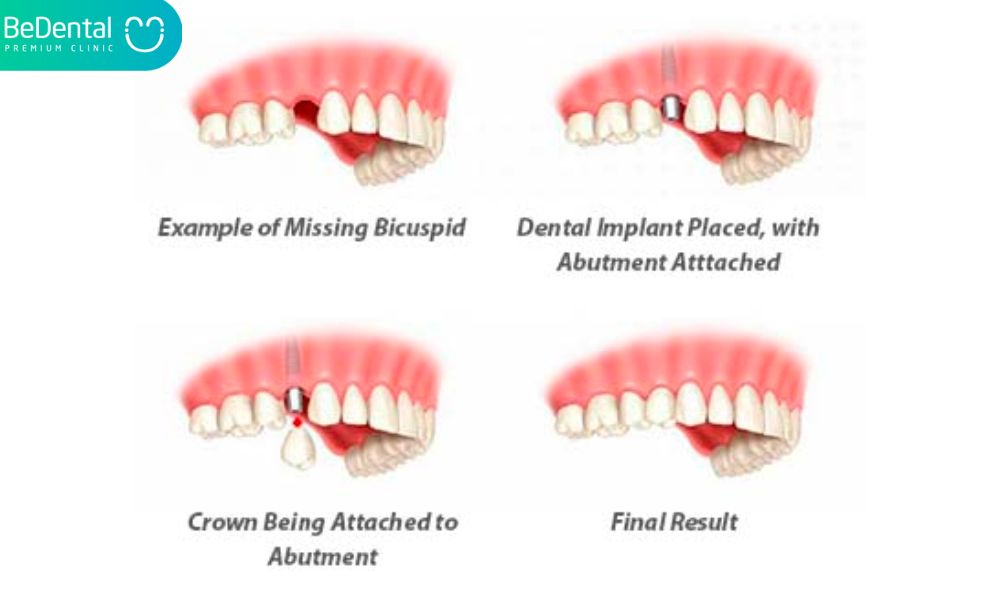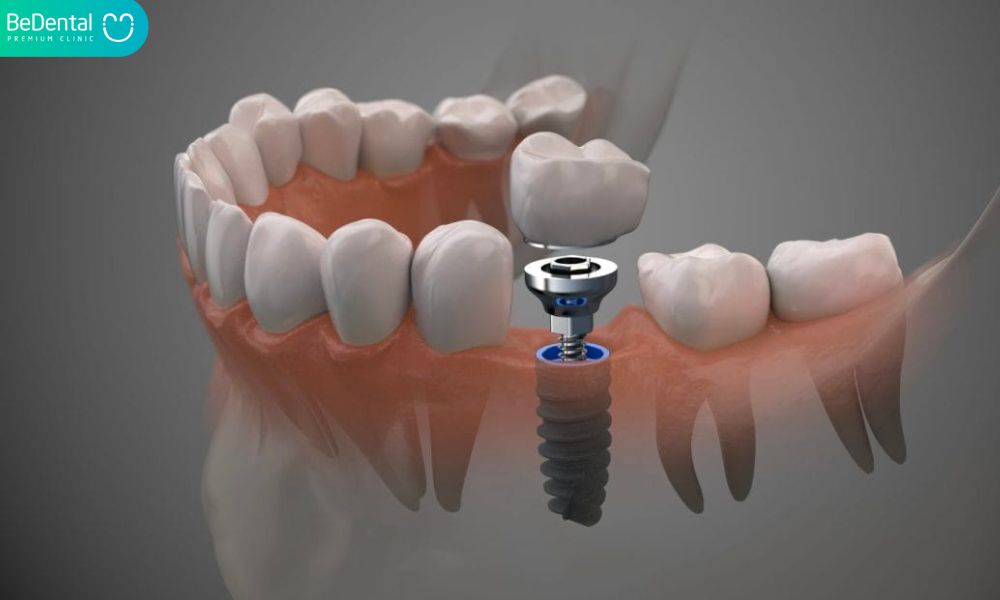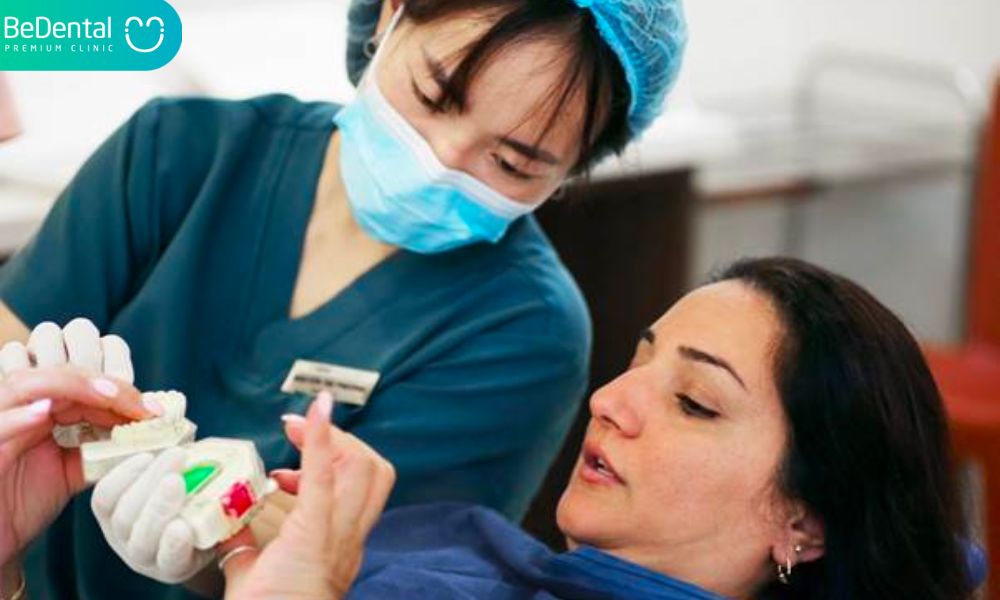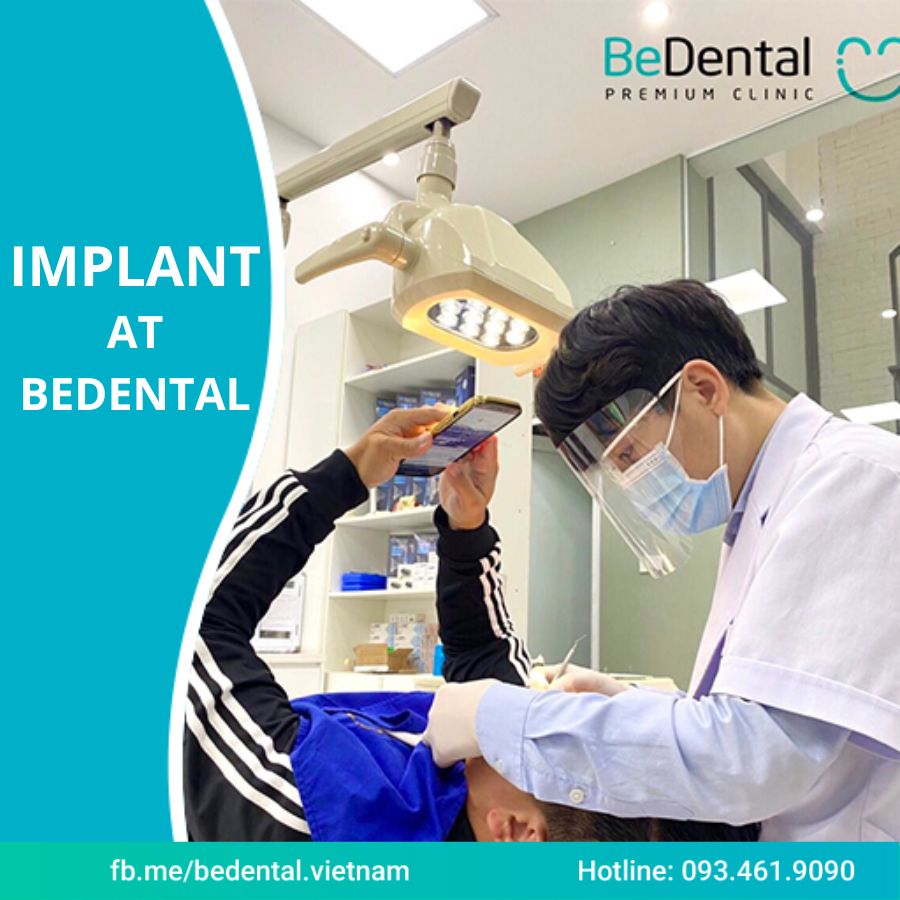People who want to save money on dental implants are turning to dental tourism more frequently, and Vietnam is one of the most popular places.
Advantages of Dental Implant
Compared to alternative tooth replacement options like dentures or bridges, dental implants provide a number of advantages. Because the titanium post is implanted into the jawbone, dental implants are long-lasting and reliable. You don’t need to alter your diet, and chewing is considerably more comfortable, because they are also incredibly sturdy and can resist the same force as your natural teeth.
As the crowns on dental implants are made of porcelain, ceramic, or zirconia to give you a more realistic-looking smile, they can also boost your attractiveness and self-confidence.
In addition to strengthening your jaw, dental implants can help prevent the atrophy of the jawbone and the tissues around it, unlike dentures which can shift and become loose with time.
Risks of Dental Implant
Although dental implant surgery carries some potential health risks, they are infrequent, and most of them can be quickly and effectively addressed. Possible complications may include:
- Infection at the implantation site
- Damage to surrounding structures like nearby teeth or blood vessels
- Nerve injury that can lead to discomfort, numbness, or tingling in your gums, natural teeth, chin, or lips
- Sinus issues if the implants are placed in the upper jaw and protrude into the sinus cavities.
Dental Implant Procedure
Dental implant surgery is a multi-stage outpatient procedure that involves several steps with intervals for healing in between.
The process begins with the removal of the damaged tooth, followed by jawbone preparation or grafting if necessary, placement of the dental implant, and the subsequent growth and healing of the bone.
The next steps involve the placement of an abutment and an artificial tooth. The entire process typically spans several months, mainly dedicated to waiting for new bone growth in the jaw to occur.

Depending on the individual’s specific needs, the treatment plan may involve a combination of procedures and materials to achieve the desired outcome.
When bone grafting is required
When considering dental implant surgery, it’s important to note that if your jawbone is too soft or thin, you may require bone grafting beforehand. This is necessary because the force exerted on your bone by the powerful chewing action of your mouth can cause the implant to fail if the bone cannot support it. A bone graft procedure can create a more stable foundation for the implant to ensure its success.
There are several options for bone graft materials, including natural bone grafts from other parts of your body or synthetic bone-substitute materials that provide supportive structures for new bone growth. Discuss with your dentist to determine the best course of action for your specific needs.
It’s important to note that the process of new bone growth following a bone graft can take several months before it is strong enough to support a dental implant. In some cases, minor bone grafting can be done concurrently with the implant surgery, reducing the overall healing time. The state of your jawbone will ultimately determine the most appropriate course of action.
Placing the dental implant

To begin the dental implant surgery, your oral surgeon will make an incision in your gum to expose the bone and create small holes where the metal post will be placed. The implant post serves as a replacement tooth root and is inserted deep into the bone.
Once the post is securely in place, there will still be a gap where the tooth is missing. To maintain appearance, a temporary partial denture may be placed, which can be removed for cleaning and while sleeping.
This part of the process is critical, as it sets the foundation for the permanent tooth replacement. With proper care and healing time, the implant will fuse with the bone to provide a strong and stable base for the artificial tooth.
Waiting for bone growth
After the metal implant post is surgically placed in the jawbone, a process called osseointegration begins. During this process, the bone grows into and fuses with the surface of the dental implant, which can take a few months. This process is vital as it creates a stable foundation for the new artificial tooth, mimicking the way that natural teeth are supported by roots.
As the jawbone heals and integrates with the implant, the artificial tooth will be custom-made to fit securely on top of the implant post. This process will result in a replacement tooth that looks, feels, and functions like a natural tooth, allowing you to enjoy normal activities like eating, speaking, and smiling with confidence.
Placing the abutment
When osseointegration is complete, you may need additional surgery to place the abutment — the piece where the crown will eventually attach. This minor surgery is typically done with local anesthesia in an outpatient setting.
To place the abutment

In certain cases, the abutment can be attached to the dental implant metal post during the initial surgery, eliminating the need for an additional surgical step. However, the abutment will be visible just above the gumline until the final tooth prosthesis is completed, which some people may find unappealing. Alternatively, some individuals prefer to have the abutment placed in a separate procedure.
Once the abutment is attached, your gums will need to heal for approximately two weeks before the artificial tooth can be affixed. During this time, your dentist will work closely with you to create a custom-made tooth that matches the size, shape, and color of your existing teeth, ensuring a natural-looking and functional replacement.
Choosing your new artificial teeth
After your gums have fully healed, your dentist will take additional impressions of your mouth and remaining teeth to create a customized crown, which will be the realistic-looking artificial tooth. The crown cannot be placed until your jawbone has fully healed and is strong enough to support the new tooth.
You and your dental specialist can discuss the different options available for artificial teeth, including:
- Removable. The snap-on overdenture is a versatile option that resembles a traditional removable denture and can be customized as a partial or full denture. It features lifelike artificial teeth enclosed by pink plastic gums, and is affixed to a metal frame that connects to the implant abutment. The overdenture snaps firmly into position and can be taken out for maintenance or daily cleaning with ease.
- Fixed. The second type of artificial teeth is permanently fixed onto an individual implant abutment with screws or cement. Unlike the first type, you can’t remove the tooth for cleaning or while you sleep. Usually, each crown is attached to its own dental implant, but it’s possible to replace several teeth by bridging them together on one implant if the implant is strong enough.
After the procedure
Undergoing dental implant surgery, whether in a single stage or multiple stages, can lead to typical discomforts similar to other dental procedures, including:
- Swelling in your gums and face
- Bruising of your gums and skin
- Pain at the implant site
- Minor bleeding
Following the surgery, you may require antibiotics or pain medications. If you experience worsening swelling, discomfort, or any other symptoms, it’s essential to contact your oral surgeon for advice.
During the healing process, you may need to consume soft foods to avoid putting stress on the surgical site. Your surgeon will typically use self-dissolving stitches, but in cases where they don’t dissolve on their own, your doctor will remove them.
The Price of Dental Implant in Vietnam
Dental implant operations in Australia are far more expensive than in Vietnam. Dental implants cost between $2,000 to $3,000 for a single implant, which is around 50% less expensive than in Australia. Dental tourism can be quite pricey due to a number of unexpected extra expenses.

You might need to make several journeys to Vietnam because dental implant treatments normally take place in two phases separated by months. This would greatly raise the price of dental implants in Vietnam. You should also account for the expense of travel to subsequent appointments and any further operations, like a sinus lift or bone transplant, that could be required based on the health of your jaws.
Vietnam’s dental care is not only inexpensive but also top-notch. It is much less pricey than Western countries and other Southeast Asian countries.
In general, Vietnam offers dental implants at a price that is around 80% less than that of the US and Australia. In Vietnam, a titanium dental implant only costs $700 to $1650. In the US or Australia, the identical surgery will cost roughly four times as much.
All-on-4 implants, for example, are about $5,800 in Vietnam, compared to $24,000 in the US, if you’re wanting to restore your whole mouth there.
The following table contrasts dental implant costs in Vietnam with those in the US and Australia.
| Procedure | Vietnam | US | Australia |
| Titanium dental implant | $700 | $5,000 | $5,500 |
| All on 4* | $5,800 | $24,000 | $27,000 |
| All on 6* | $7,500 | $28,000 | $30,000 |
| All on 8* | $10,000 | $35,000 | $32,000 |
| Bone Graft (per unit) | $200 | $2,000 | $2,500 |
| Sinus lift | $250 – $400 | $2,000 | $2,500 |
*Per jaw
Prices might change at any time. Due to these pricing, you are only spending a small portion of what you would in the US or Australia in Vietnam.
Therefore, you can be confident that you will save enough money to take a family vacation while receiving high-quality dental implant care.
How to Lower Dental Implant Costs at Home?
Dental tourism exposes patients to unnecessary risks and may end up costing you the same, if not more, than it would to have dental implants in Australia without the benefits of a local dentist, regulated materials, and a government body for recourse if the treatment goes wrong.
There are several ways to lower the price of dental implants. Look it up to discover whether your current insurance policy covers dental implants. A part of the cost could be covered by some providers if it is deemed medically necessary. If not, think about changing your plans.
Certain people are eligible for reduced dental care through government-funded dental programs. Find out if dental procedures are covered by Medicare or the federal assistance office in your state, as well as the qualifications needed to receive coverage.
You can be eligible for a personal loan with good credit to pay for dental implants. This will make it possible for you to make manageable monthly loan repayments.
Why Choose Vietnam for Dental Implants?
Vietnam is a rapidly expanding country. It is well renowned for being a top location for wellness and healthcare services. Every year, it sees more than 80,000 international patients for medical evaluations and treatments.
Vietnam is a secure location for foreign travelers interested in dentistry tourism due to its political stability. The nation offers top-notch medical treatment at reasonable prices.

In addition to cost, other important factors for receiving dental implants in this situation include:
- Convenient Location – Accessible from Southeast Asian nations
- Best Services – Modern dental facilities provide a better dental experience.
- Best Dentists – With over 10 years of expertise, our partner dentists
- Fast Treatments – Dental labs on-site make sure that treatment times are kept to a minimum
Vietnam’s Best Dentist for Dental Implants
BeDental will be the best choice for those who want to experience the top-notch facilities and qualified dentist.
BeDental was established in 2012. After a period of operation, the center quickly became a popular address for providing dental services and a leader of the dentistry field. With highly trained dental professionals, the latest facilities including a 3D Scan CT scanner, Panorama and Cephalo X-ray machines, a laser teeth whitening system, etc, and advanced technology, BeDental is going to become the best dentistry center in Vietnam.

BeDental was established with the mission “Sow smile, spread success”, and believe that everyone deserves to have a charming and confident smile. That’s why Be tried their best to solve the dental problems or obstacles that hide your stunning smile.
With the best dental professionals in Vietnam, BeDental brings devotion and dedication to every customer as if we were family. BeDental is a reputable and professional dental system with various branches in city centers, which helps customers travel easily.
More
Teeth cleaning and 3 main concerns
Tooth extraction and 4 noticeable questions need to know
Wisdom Teeth and 4 Typical Symptoms
Zirconia Prosthetics Used to Treat Cavities and Tooth Sensitivity
Chipped tooth: Causes, Symptoms and 4 ways to Handle
